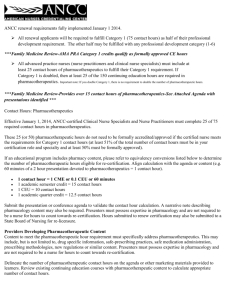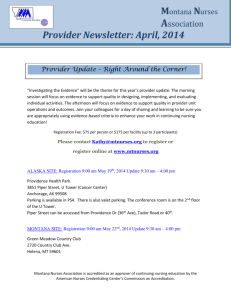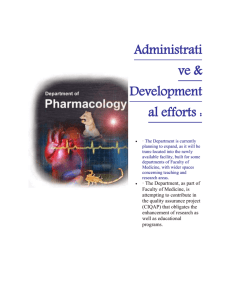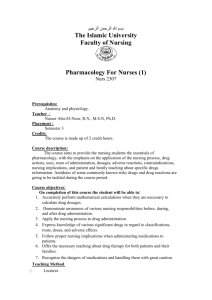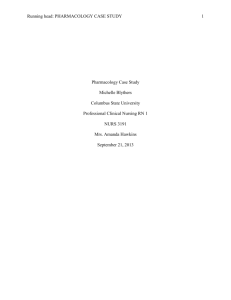MSN6215 - Weber State University
advertisement
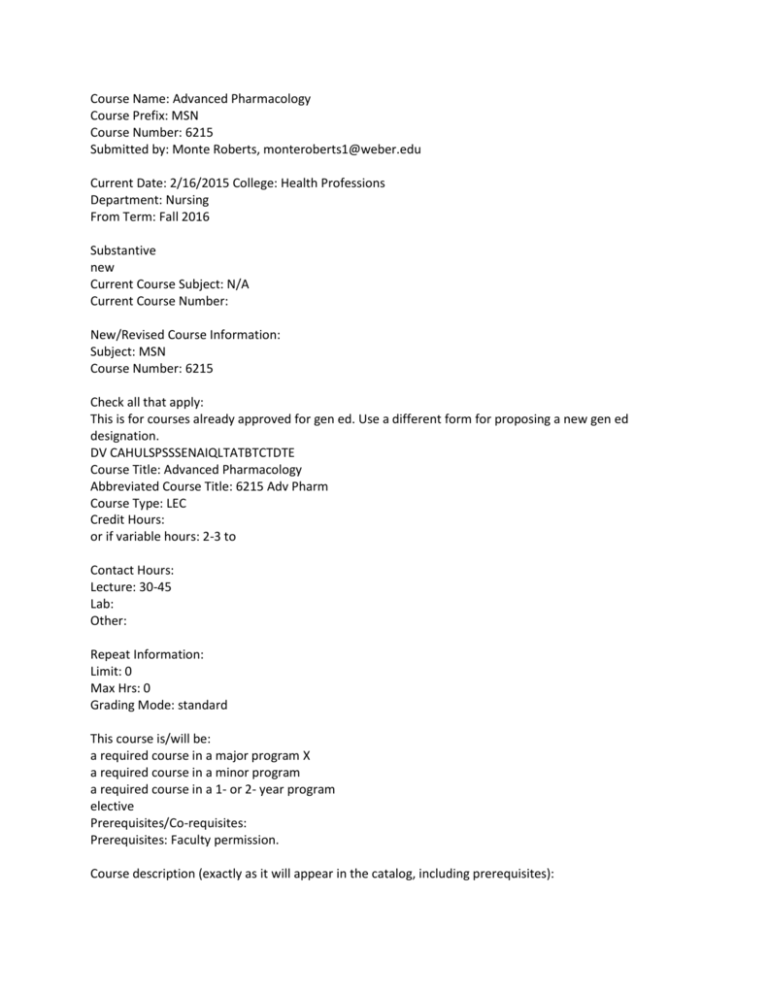
Course Name: Advanced Pharmacology Course Prefix: MSN Course Number: 6215 Submitted by: Monte Roberts, monteroberts1@weber.edu Current Date: 2/16/2015 College: Health Professions Department: Nursing From Term: Fall 2016 Substantive new Current Course Subject: N/A Current Course Number: New/Revised Course Information: Subject: MSN Course Number: 6215 Check all that apply: This is for courses already approved for gen ed. Use a different form for proposing a new gen ed designation. DV CAHULSPSSSENAIQLTATBTCTDTE Course Title: Advanced Pharmacology Abbreviated Course Title: 6215 Adv Pharm Course Type: LEC Credit Hours: or if variable hours: 2-3 to Contact Hours: Lecture: 30-45 Lab: Other: Repeat Information: Limit: 0 Max Hrs: 0 Grading Mode: standard This course is/will be: a required course in a major program X a required course in a minor program a required course in a 1- or 2- year program elective Prerequisites/Co-requisites: Prerequisites: Faculty permission. Course description (exactly as it will appear in the catalog, including prerequisites): This course presents the pharmacokinetics and pharmacodynamics of medication management. Nurse practitioners students are prepared to safely prescribe and monitor medication regimens for patients across the lifespan. The course will include ethical and legal parameters surrounding prescriptive practice. This course meets the basic accreditation criteria for graduate nursing pharmacology. Prerequisites: Faculty permission. Justification for the new course or for changes to an existing course. (Note: Justification should emphasize academic rationale for the change or new course. This is particularly important for courses requesting upper-division status.) Graduate nursing program accrediting bodies (ACEN & CCNE) and nurse practitioner certification testing (ANCC & AANP) requires nursing students in graduate level programs to obtain course work in graduate level pathophysiology, pharmacology and physical assessment. INFORMATION PAGE for substantive proposals only 1. Did this course receive unanimous approval within the Department? true If not, what are the major concerns raised by the opponents? 2. If this is a new course proposal, could you achieve the desired results by revising an existing course within your department or by requiring an existing course in another department? There is not a graduate level pharmacology course offered for advanced level registered and practicing nursing students. 3. How will the proposed course differ from similar offerings by other departments? Comment on any subject overlap between this course and topics generally taught by other departments, even if no similar courses are currently offered by the other departments. Explain any effects that this proposal will have on program requirements or enrollments in other department. Please forward letters (email communication is sufficient) from all departments that you have identified above stating their support or opposition to the proposed course. No other graduate course is offered. This course will not overlap or affect any other departmental offerings. 4. Is this course required for certification/accreditation of a program? yes If so, a statement to that effect should appear in the justification and supporting documents should accompany this form. 5. For course proposals, e-mail a syllabus to Faculty Senate which should be sufficiently detailed that the committees can determine that the course is at the appropriate level and matches the description. There should be an indication of the amount and type of outside activity required in the course (projects, research papers, homework, etc.). Please mail a signed approval pageto the Faculty Senate Office, MA 210J, MC 1033. WEBER STATE UNIVERSITY SCHOOL OF NURSING Course Syllabus A. COURSE NUMBER AND NAME: MSN 6215 Advanced Pharmacology B. CREDIT HOURS: Two (2) to three (3) credit hours C. COURSE DESCRIPTION: This course presents the pharmacokinetics and pharmacodynamics of medication management. Nurse practitioners students are prepared to safely prescribe and monitor medication regimens for patients across the lifespan. The course will include ethical and legal parameters surrounding prescriptive practice. This course meets the basic accreditation criteria for graduate nursing pharmacology. Prerequisites: Faculty permission. D. COURSE OUTCOMES: Upon completion of this course, the student will be able to: 1. Develop therapeutic pharmacologic management plans for patients across the lifespan. 2. Determine effective drug regimen plans based patient development, illness, disease or patient symptomology. 3. Discuss drug to drug interaction and prescription of controlled substances 4. Apprise current evidence to determine best practice across the lifespan. 5. Evaluate quality and safety standards to improve the healthcare system. 6. Calculate risk of harm to patients and providers through the evaluation of system effectiveness and individual performance. 7. Defend basis for diagnosis and prescription management across the lifespan. E. 1. 2. 3. 4. 5. 6. 7. COURSE CONCEPTS: Acid-base balance Cellular Regulation Fluid & Electrolytes Immunity Inflammation Intracranial Regulation Metabolism • • • • TEACHING STRATEGIES: Individual and Group Focused Discussion Group Presentation Selected readings Structure discussion & critical thinking exercises (face-to-face & online-asynchronous) F. • • G. • • • • • • • Scholarly assignments designed to support development of an evidence-based innovation and application Simulation Activities METHODS OF EVALUATION: Content Expert Group Presentation Course participation/preparation & responses to structured discussion & critical thinking exercises (face-to-face /online asynchronous discussions) Case studies Quizzes Testing Peer Review Debriefing Grading Scale: 100-95% = A 94 90% = A89-87% = B+ 86-83% = B 82-80% = B79-77% = C+ 76-73% = C 72-70% = C69-67% = D+ 66-63% = D 62-60% = D59% and below=E Students must have an 80% average in this course to pass the course and continue in the nursing program. (Refer to Nursing Department Student Handbook) To receive a grade, all course requirements must be met. H. REQUIRED TEXTS: 1. Edmunds, M. E. & Mayhew, M. S. (2013). Pharmacology for the primary care provider. (4th ED.). St. Louis, MO: Elsevier/Mosby. I. RECOMMENDED TEXT: J. COURSE FORMAT: 1. Basic Principles of Pharmacotherapeutics a. Pharmacokinetics b. Pharmacodynamics i. Pharmacogenetics 2. Complimentary Therapy / Skin and Eye and Ear a. Complementary and Alternative Therapies i. Herbal Therapies ii. Dietary Supplements iii. Specialty Supplements b. Integumentary – Acne, Rosacea c. Eye- Glaucoma, Dry Eye d. Ear- Cerumenolytics 3. Anti-infectives I a. Anti-infectives i. ii. iii. iv. v. Inhibition of Cell Wall Synthesis Medications Inhibition of Protein Synthesis Medications Disruption of Plasma Membrane Medications Inhibition of Nucleic Acid Synthesis Medications Inhibitions of Metabolic Pathways Medications 4. Anti-infectives II a. Antifungal Medications b. Antiviral Medications c. Mycobacterial Medications i. Pharmacotherapeutic Management of Tuberculosis d. Antiretroviral Medications i. Pharmacotherapeutic Management of HIV-AIDs 5. Respiratory Medications a. Pharmacotherapeutic Management of Coughs, Colds, and Influenza b. Pharmacotherapeutic Management of Asthma and COPD c. Pharmacotherapeutic Management of Seasonal Allergies 6. Cardiovascular and Renal I a. Pharmacotherapeutic Management of Hypertension b. Pharmacotherapeutic Management of Heart Failure c. Pharmacotherapeutic Management of Angina Pectoris 7. Cardiovascular and Renal II a. Pharmacotherapeutic Management of Hyperlipidemia b. Pharmacotherapeutic Management of Anemia i. Microcytic Anemias ii. Macrocytic Anemias c. Anticoagulants 8. Digestive a. Vitamins and Minerals b. Pharmacotherapeutic Management of Nausea, Vomiting, Diarrhea, and Constipation c. Pharmacotherapeutic Management of Irritable Bowel Syndrome, Gastroesophageal Reflux Disorder and Peptic Ulcer Disease d. Pharmacotherapeutic Management of Side Effects of Chemotherapy 9. Metabolic a. Pharmacotherapeutic Management of Thyroid Disorders b. Pharmacotherapeutic Management of Type 1 and 2 of Diabetes Mellitus c. Corticosteroids 10. Metabolic a. Hormone Replacement Therapy b. c. d. e. Hormonal Contraceptives Pharmacotherapeutic Management of Menstrual Disorders Pharmacotherapeutic Management of Osteoporosis Pharmacotherapeutic Management of Erectile Dysfunction 11. Immunity a. Immunosuppressants b. Immunostimulants c. Immunizations 12. Comfort a. Pharmacotherapeutic Management of Pain b. Pharmacotherapeutic Management of Inflammation c. Pharmacotherapeutic Management of Musculoskeletal Trauma 13. Intracranial Regulation a. Pharmacotherapeutic Management of Anxiety and Mood Disorders b. Pharmacotherapeutic Management of Psychosis c. Pharmacotherapeutic Management of Sleep Disorders d. Pharmacotherapeutic Management of ADHD 14. Intracranial Regulation a. Pharmacotherapeutic Management of Seizures b. Pharmacotherapeutic Management of Migraine Headaches c. Pharmacotherapeutic Management of Parkinson’s Disease d. Pharmacotherapeutic Management of Alzheimer’s Disease K. PROFESSIONAL CONDUCT: Students are expected to abide by the WSU student code and the Nurse Practice Act of the State of Utah. Plagiarism or any other form of cheating will result in failure of the course and probable dismissal from the FNP program. WSU subscribes to Turnitin.com, an electronic service that verifies the originality of student work. Enrollment in this course may require you to submit some or all of your assignments to it this semester, and documents submitted to TurnItIn.com are retained anonymously, in their databases. Continued enrollment in this course constitutes an understanding of an agreement with this policy. L. SYLLABUS DISCLOSURE STATEMENT: The syllabus is the governing document for this course. Your decision to take this course amounts to your tacit consent to the conditions of this syllabus. The professor, as well, is bound by the terms of this syllabus and may not make any significant changes, unless the class as a whole approves them. M. SERVICES FOR STUDENTS WITH DISABILITIES: Services for Students with Disabilities: Any student requiring accommodations or services due to a disability must contact Services for Students with Disabilities (SSD) in room 181 of the Student Service Center. SSD can also arrange to provide course materials (including this syllabus) in alternative format if necessary. Disabled individuals requesting accommodations should be referred to SSD so that disability documentation can be acquired and appropriate accommodations arranged. Please phone: 801-626-6413.
